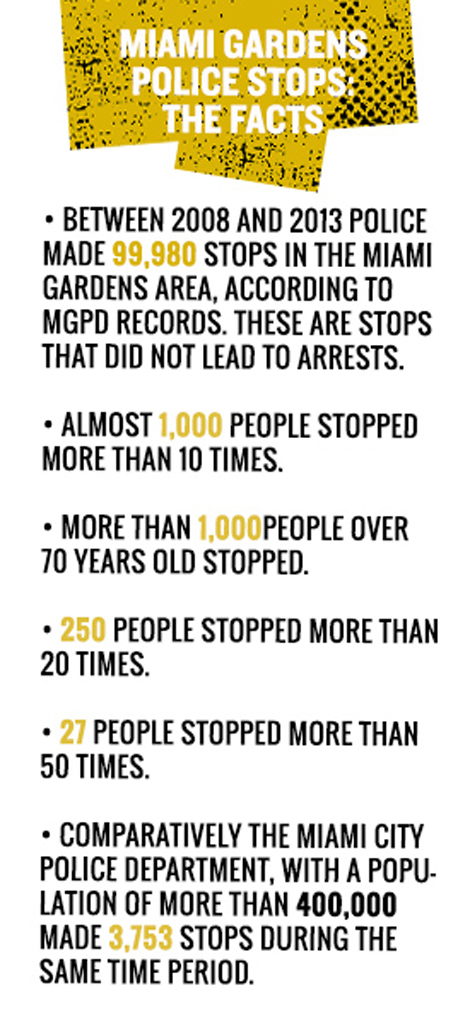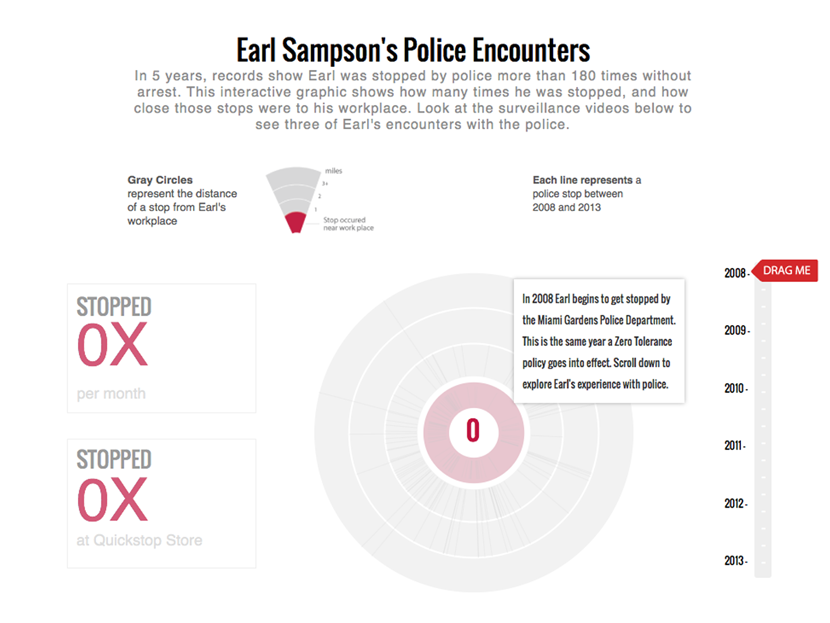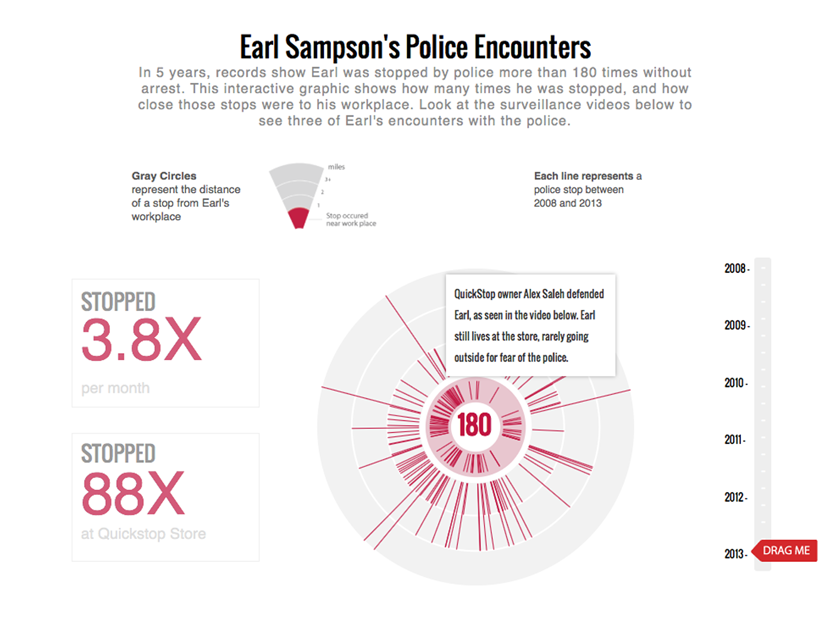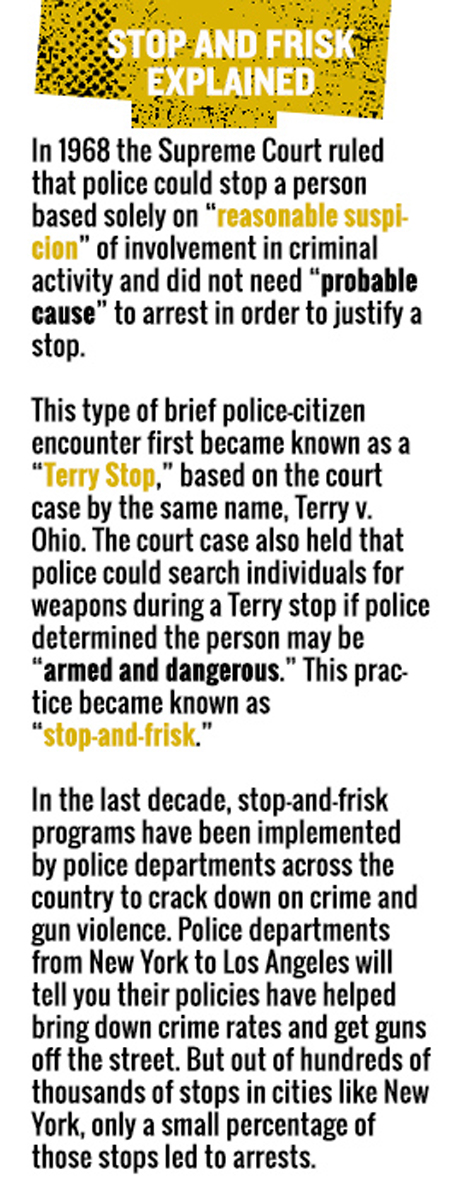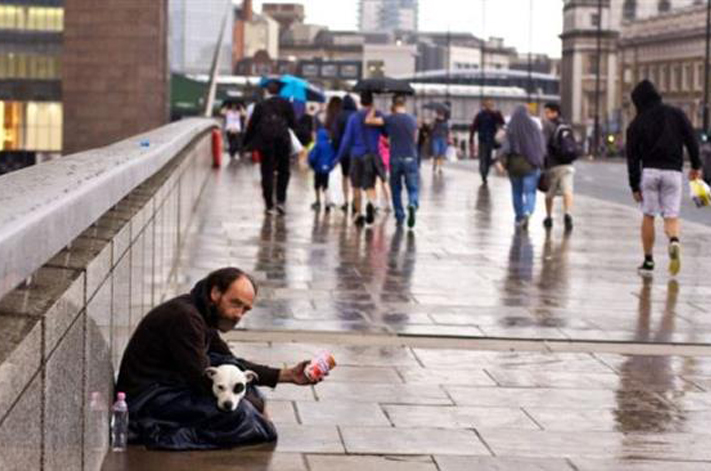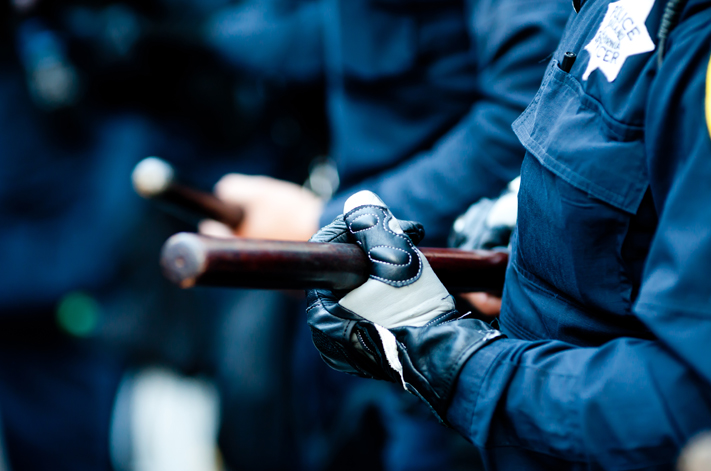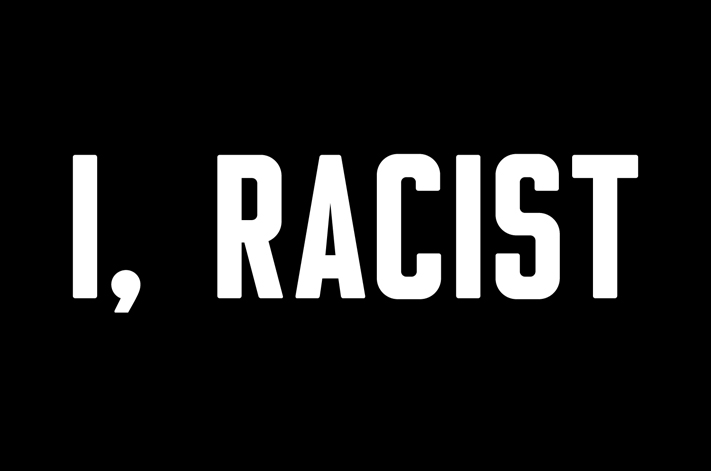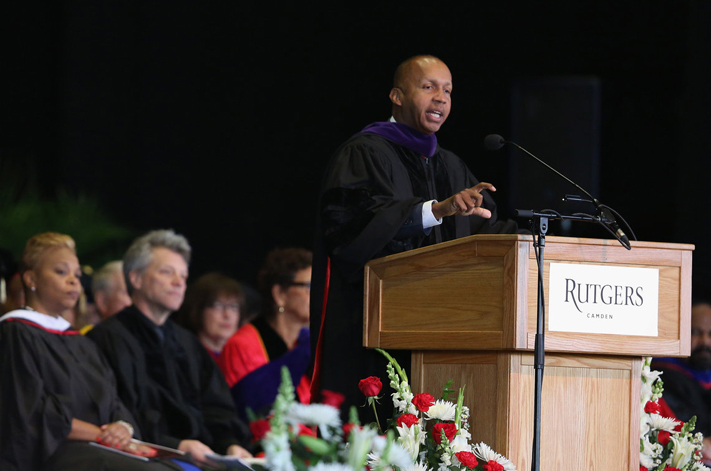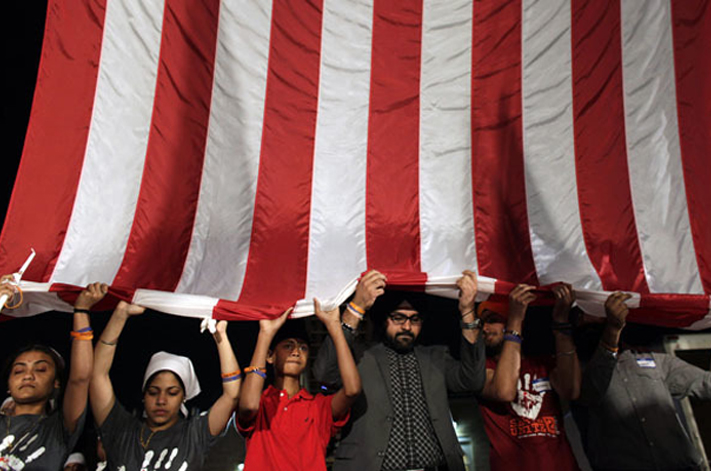Project Description
MIAMI GARDENS POLICE RECORDS REVEAL BROAD POLICY OF STOPPING AND QUESTIONING CITIZENS
8,489 KIDS, AND 1,775 SENIOR CITIZENS CAUGHT UP IN CITY’S VERSION OF 'STOP & FRISK'”
An Excellent Education is Not Enough to Counter What Occurs Outside the Classroom.
America, Our Brothers, Sisters, and Children Are Hurting
In the summer of 2010, a young black man was stopped and questioned by police on the streets of Miami Gardens, Florida. According to the report filled out by the officer, he was “wearing gray sweatpants, a red hoodie and black gloves” giving the police “just cause” to question him. In the report, he was labeled a “suspicious person.”
He was an 11-year-old boy on his way to football practice.
A Fusion investigation has found that he was just one of 56,922 people who were stopped and questioned by Miami Gardens Police Department (MGPD) between 2008 and 2013. That’s the equivalent of more than half of the city’s population.
It was all part of the city’s sweeping “stop and frisk” style policy that may be unparalleled in the nation.
According to a review of 99,980 “field contact” reports, they were stopped, written up and often identified as “suspicious” — but just like the 11-year-old boy — the encounter was recorded in a public database, and they were let go.
Thousands more were arrested after being stopped by the police, raising the total number of people ensnared by the policy to 65,328 during the five-year period.
“I have never seen a police department that has taken the approach that every citizen in that city is a suspect. I’ve described it as New York City stop-and-frisk on steroids.” said Miami-Dade County Public Defender Carlos Martinez.
Last year, a Miami Herald report exposed how the MGPD repeatedly stopped and arrested employees and customers of a local convenience store including, Earl Sampson, who was stopped more than 200 times.
Fusion’s analysis of more than 30,000 pages of field contact reports, shows how aggressive and far-reaching the police actions were. Some residents were stopped, questioned and written up multiple times within minutes of each other, by different officers.
Children were stopped by police in playgrounds. Senior citizens were stopped and questioned near their retirement home, including a 99-year-old man deemed to be “suspicious.” Officers even wrote a report identifying a five-year-old child as a “suspicious person.”
Fusion’s Investigation also found evidence that some field contact reports may have been falsified. There were many instances were multiple reports were filed just minutes apart – all claiming to stop the same person. Other reports claimed a person was stopped on the streets by police, when in fact, they were actually in jail at the time.
Two officers from the MGPD told Fusion that high-ranking department officials gave them orders to “bring in the numbers” by conducting stops and arrests. One officer said he was ordered to stop all black males between 15 and 30 years of age.
According to the current police chief, simply being in a “high crime area” may be enough reason to stop and question people. Because of the city’s high crime rate, this means virtually any person can be stopped.
“You’re essentially saying you have reasonable suspicion to stop everybody in your community. That’s crazy, because that means they’re exercising no discretion,” says Martinez, the Miami-Dade public defender.
8,000 KIDS CAUGHT UP IN ZERO TOLERANCE POLICY
'It’s like making a deal with the devil. In order for you to stay here you gotta have a record. You can’t be the only one over here without a record so what we have to do is we are gonna make you have a record.'
~ Denzel Flowers
Denzel Flowers remembers the first time he was stopped by the Miami Gardens Police Department. He said he was hanging out in a neighborhood park in the middle of the day when police approached him. Denzel said he was just 15 years old.
“We were all chillin’ in the park,” says Denzel, now 20. “The police stopped everybody. Told us don’t move and ran everybody’s names.”
That was the first of a string of 27 police stops, according to field contact records examined by Fusion. Denzel was also arrested four times before he was 18 years old, but he has never been convicted of any crime.
“I couldn’t leave my house without being in fear,” he says.
Thousands of others ages 18 and under also had encounters with Miami Gardens police as recorded in field contact reports like this one.

MAN STOPPED MORE THAN 200 TIMES BY THE MIAMI GARDENS POLICE DEPARTMENT
8,000 KIDS CAUGHT UP IN ZERO TOLERANCE POLICY
'It feels like I ain’t got no rights, no say so. Like I’m just a number,'
~ Earl Sampson
Earl Sampson has worked for nearly three years at the 207th Street Quickstop, a convenience store that has become the epicenter for police stops.
Earl, 28, says he’s been stopped more than 200 times by the Miami Gardens Police Department. According to records obtained by Fusion, MGPD stopped him and filed a field contact report 181 times. In addition, Earl was arrested 111 times. Seventy-one of those arrests were for trespassing at his place of work.
Since the Miami Herald first reported Earl Sampson’s story last year, Quickstop owner Alex Saleh has launched a civil rights lawsuit against the police department and the City of Miami Gardens.
Alex says it all started with the police department’s “zero tolerance” policy, meant to bring down the crime rate by stopping suspected trespassers and loiterers at area businesses. But Alex says police took it too far and now calls police “bullies with badges.”
“I see how officers walk in and take everybody,” Alex told Fusion. “I see there was abuse.”
Alex says he was so appalled that he installed video surveillance cameras in his store — not to record crime but to record police misconduct.
In January 2012, Alex says he gave his employee, Earl Sampson, a place to live inside the store to protect him from the police. But even that was no deterrent. In this security video, police are seen storming into Earl’s bedroom in the back of the store. Then Alex Saleh is seen stepping in, demanding police leave Earl alone. Moments later, the police can be seen turning around and leaving the store.
Earl Sampson's Police Encounters
In 5 years, records show Earl was stopped by police more than 180 times without arrest. This graphic shows how many times he was stopped, and how close those stops were to his workplace. Look at the surveillance videos below to see three of Earl's encounters with the police.
Front of Quicktop
At QuickStop Earl was stopped walking into his workplace
Earl was stopped while doing his job at the QuickStop
Earl was arrested in his bedroom, but the Quickstop owner stepped in to protect him
CHASING QUOTAS NOT CRIME
Two MGPD officers who asked Fusion to protect their identities spoke with us on camera about an unofficial policy of quotas and racial profiling that was rampant in their department. They say they were told by superiors to “get the numbers up” and they were ordered to stop black males between 15 and 30 years old. One officer also told Fusion that field contact reports were falsified to meet the quotas. Such reports were even produced about people who “were still sitting in the county jail,” the officer said.
'My major walked in and verbally told us...he wants all Black males stopped... between the ages of 15 and 30 years old.'
~ Miami Gardens Police Officer
Allegations that some of the police stops may be falsified is supported by Fusion’s analysis of about 30,000 pages of records provided by the Miami Gardens Police Department.
For example, according to the police records, Earl Sampson was stopped on November 3, 2010, at 9:24 p.m. at 21099 Northwest 32nd Avenue in Miami Gardens. The field contact report notes a “suspicious person.” He told police officers he was going to the store.
Then the records show another field contact report, from just one minute later, at 9:25 p.m. In that report, Sampson was stopped for “loitering” at the Quickstop at 3185 NW 207th Street, where he works.
The two locations are nearly one-third of a mile apart, and take approximately 5 minutes to walk.
Fusion’s analysis of the field contact records found several instances in which one individual was written up multiple times, by different officers, all within a few minutes.
“That’s falsifying an official documentation,” said one of the police officers who told Fusion the command staff of the MGPD was after one thing: “Numbers.”
“They created statistics and it was done to the detriment of the Miami Gardens community,” says attorney Stephan Lopez. “These cases were manipulated. They were fabricated.”
Between 2008 and 2013, the City of Miami Gardens received over 15 federal grants, many of which were tied, in part, to funding overtime details to support the zero tolerance policy program, according to documents obtained by Fusion.
Internal emails from Miami Gardens Police Department obtained by Fusion show how commanders encouraged their officers to take overtime assignments to reduce violent crime. In this email sent Nov 7, 2013, a captain calls on officers to take a “hands-on approach.” Two of the priorities were to be “field contacts” and “stop and frisk.”
Attorney Stephan Lopez who filed a federal civil rights lawsuit against the City of Miami Gardens on behalf of Alex Saleh and nearly a dozen others, says the MGPD’s approach to policing is unconstitutional.
Lopez also believes many people were falsely arrested.
“People were repeatedly arrested, taken to the Miami-Dade County Jail for crimes that the officers knew they did not commit, but felt they were doing it under the authority vested in them by the city through the zero tolerance policy,” he said.
'EVERY CITIZEN A SUSPECT'
“The result is that you have a majority black population that are all being subjected to very heavy-handed police tactics that result in a public record being created either of them being stopped or them being arrested,” says Miami Dade Public Defender Carlos Martinez. “I don’t know anywhere else in the country where that’s happening.”
The Miami-Dade County’s Public Defender’s office is now trying to help many people who believe they were wrongfully stopped or arrested and want to get their records cleared. Martinez is calling for the U.S. Department of Justice to investigate the Miami Gardens Police Department for civil rights violations.
There are serious civil rights violations that have been taking place in that city and I think the federal government needs to take a look at it'
~ Carlos Martinez, Public Defender of Miami
A FEW MILES SOUTH, A DIFFERENT APPROACH
The City of Miami, just a few miles south, has a population nearly four times as large as Miami Gardens. Yet between 2008 and 2013, the Miami City Police Department recorded only 3,753 Field Contact reports, compared to Miami Gardens 99,980.
Miami City Police Officer Jerry Sutherland took Fusion on a ride along to talk about policing strategy in high-crime neighborhoods.
''We all have rights. And before I take any police action, I always ask myself these questions. I would say, if it was you walking down the street, would you appreciate being stopped by a police officer just for walking down the street? And the second question I ask. Is it right to do that?'
~ Officer Jerry Sutherland, Miami City Police Department
NEW POLICE CHIEF ALARMED BY DATA
In April, the Miami Gardens Police Department welcomed a new chief, Stephen Johnson. He’s the third Chief of Police in less than six months. Though his predecessors declined our request for an interview, he agreed to sit down with Fusion.
'As of my start date, there are no quotas in the City of Miami Gardens Police Department.'
~ Chief Stephen Johnson
In an interview with Fusion, Chief Johnson said he is willing to look into the records of anyone in Miami Gardens who “feel
Miami-Dade County’s Public Defender Carlos Martinez is trying to help individuals get their records cleared, but says it is difficult to work on records going back more than two years.
So far his office has been able to help a handful of individuals. One individual has over 20 records that will soon be dropped entirely, says Theresa Enriquez, an attorney with the Miami-Dade Public Defenders office.
The federal civil rights lawsuit filed by attorney Stephan Lopez is set to begin depositions in June.
The City of Miami Gardens and the Police Department have denied in court papers allegations that it engaged in unlawful conduct.
Like the office of the Miami-Dade County Public Defender’s office, Stephan and his clients have requested the Department of Justice investigate the Miami Gardens Police Department.
Special thanks to Susan McGregor from the Columbia School of Journalism for her help with the data element in this story.
Javier Castro, Roberto Daza, Natasha Del Toro and Rayner Ramirez contributed to this report. Interactive design: Manuel Canales
